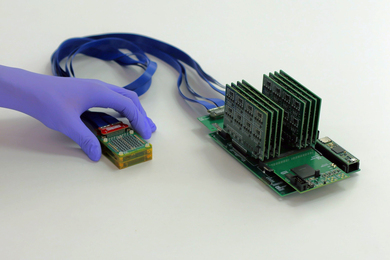Random dinner invitation from stranger could lead to rewarding social experience. Fortune cookie or MIT fact?
This winter and spring, it became a fact when 300 randomly selected graduate students were invited to dinner by Alisa Morss, a graduate student in health sciences and technology who received a Graduate Student Life grant to hold three Random Grad Student Dinners at the MIT Museum.
"I really firmly believe that graduate school doesn't have to be such a painful experience. It's a really good time in your life. You're in your twenties and you're learning and discovering and getting to do what you want to do much more than you do in, say, an engineering job," said Morss, who is a member of the Committee on Student Life.
The idea for the dinners sprang from that committee and was patterned after Professor Samuel "Jay" Keyser's Random Faculty Dinners. The plan is to get graduate students out of their labs and living rooms and into a social situation with grad students from other departments, and at the same time provide them access to administrators who can improve the grad school experience.
"It's important to give people the opportunity to enjoy their time in graduate school," said Morss. "You can't force them, but you can provide the opportunity."
Judging from survey responses, most of the diners appreciated the opportunity--"It was a great event." "Fun." "I'm glad I went." "It was nice to meet new people." "An inviting atmosphere." "Should happen more often."
Morss invited a handful of administrators to each dinner, including Dean for Graduate Students Isaac Colbert, whose office sponsors the Graduate Student Life grants program through allocation of the graduate student life fee. The Graduate Students Office (GSO) has awarded nearly 50 grants during the past two years.
Morss, who is also a member of the committee that selects the projects, said the committee looks for original ideas for small to medium-sized events that bring together students who normally wouldn't interact. The panel is particularly interested in projects that serve underrepresented groups such as international students or students with families. The committee hopes to provide seed funding to launch projects that can obtain future funding elsewhere for continuation.
Morss' $4,000 grant provided most of the funding for her dinners. Roughly 25 students attended each (a 25 percent acceptance rate on her invitations) along with five or six administrators. With the success of these first three random dinners, she hopes to find more permanent funding to establish the gatherings as an MIT tradition.
Each of the evenings had its own theme with a speaker to encourage discussion around that theme after the meal. For instance, Stephen Immerman, senior associate dean for student life and executive director of Enterprise Services, led a discussion at the February dinner about the types of businesses and services that graduate students might like to see spring up along Massachusetts Avenue between MIT and Central Square.
The Graduate Student Life grants are just one aspect of a new emphasis on improving graduate student community at MIT, which sprang from the 1998 report of the Task Force on Student Life and Learning. As part of its ongoing initiative, the GSO is gathering input from graduate students through surveys and advisory committees to learn how to improve the graduate student experience at MIT.
A sampling of other Graduate Student Life grants:
- $850 for mathematics students to dine out with faculty members.
- $2,000 to support "Hidden Jewels of Our Community," a juried art show for work by graduate students and spouses.
- $2,500 to the Sand Mandala project at Simmons Hall.
- $1,000 for a babysitting exchange among graduate student families, both on and off campus.
- $3,000 to provide child care to students and their families so they can attend meetings of organizations that have a direct impact on them.
- $5,000 for attendance at performing arts events around Boston and pre- or post-performance discussions.
A new round of proposals will be accepted next fall. For more information, go to http://web.mit.edu/gso/community/community.html.
A version of this article appeared in MIT Tech Talk on June 2, 2004 (download PDF).





